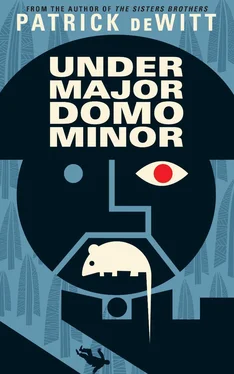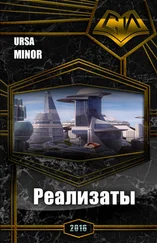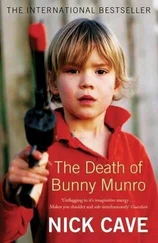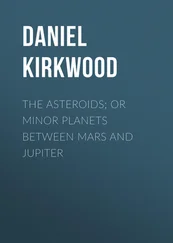“It is not dull.”
“It’s consummately dull. It’s immaculately dull.”
“I love it,” she said, and she did.
In a humouring tone, he asked, “Tell me, what do you love about it?”
“My father, and my friends. The animals, the rivers. I love the seasons; I think they are just the right length of time, don’t you?”
The stranger didn’t answer.
Klara said, “I love the fields, there —” she nodded towards the sloping green expanse beyond the castle. The stranger sat up to look.
“What’s over the rise?” he asked.
“More of the same.”
“Do you ever go there?”
“Sometimes.”
He looked at her directly. “Will you take me there?”
“But why?”
“Don’t you think it’s about time we were alone?”
“We’re alone now.”
“Alone, but not alone-alone. I want to be alone-alone.”
He stood up and looked over her. He was quite a bit taller than she.
“Will you be alone-alone with me,” he said.
He led Klara away, over the crest of the hill. His hand was calloused and gripped hers tightly. She could smell his body, and the fluttering in her stomach was violent to the edge of nausea. She wore no shoes, and watched her feet swivelling up and back through the grass and flowers. She wasn’t precisely sure what she was walking towards but she wouldn’t have turned around for the world. Once they were over the rise she tucked her hair behind her ears, looking about for a piece of level ground. Finding one, she pointed. “There.” They walked towards the place.
Lucy was disturbed by the pride with which Klara told this story; she was pleased with herself for having an adventuresome spirit, and this hurt him. He knew he was being small about it, but there was no other way he could feel. He was putting his clothes back on when he noticed a wasp struggling to free itself from a spider web, this attached to the low branch of a nearby tree. The webbing bounced and vibrated and Lucy moved closer to watch, with Klara following after. The wasp’s manic buzzing filled her with dread, and she said, “Set it loose, Lucy.”
“No,” he said. “Look.” Over top of the branch came the spider, its legs, its head, its plump bobbing bottom. It was very large, and its weight stilled the web, and the wasp for a moment ceased struggling. But then, as if knowing what was to come, and with the spider stepping ever closer, it redoubled its efforts to free itself, its buzzing jumping an octave.
The spider circled the wasp, searching out the prime point of attack. It had looped the web two full times before it lunged; as the insects met, then did the wasp plunge its stinger into the spider’s face, the reaction to which was instantaneous death: the spider dropped, yet remained attached to the web by a single silver thread strung out from its abdomen. It hung in space, lifeless, rotating in the breeze.
Something about this occurrence displeased, even offended Lucy, and he watched the spider with an angry expression. He held his boots one in each hand. He lifted them to either side of the spider.
“What are you doing?” Klara asked.
Lucy didn’t answer, but clapped the soles of his boots together, popping the spider like a grape. Klara was disgusted by this.
“Why would you do such a thing?” she asked.
“I don’t know,” Lucy admitted. He was surprised at himself.
“Well, I think that was terrible, your doing that.”
Lucy didn’t know what to say. He turned away from the web and sat to put his boots on. Klara stood by, quietly fuming. She felt she deserved an apology, though she didn’t quite know why. She walked away, towards the village, and Lucy watched her go but didn’t call after her or to try to win her back. Returning to her shanty, she wept on her bed for near an hour. The next day Lucy apologized, and all was as it had been before. Neither one of them understood this argument, and they agreed not to speak of the spider or the strange Eastern stranger again.
A village woman had taken ill and left her infant child with Klara for some days; she and Lucy set up to play house in a manner which was at first light of spirit, but which took on a certain seriousness, then an absolute seriousness. This is how it would be , was Lucy’s thought, and it worried him because he had never been so satisfied before.
The child’s name was Anna, and she had purple eyes and was fat as a piglet. Her mood was typically jolly, her laughter quick to come and difficult to arrest, but on the third night something upset her so that she wouldn’t cease crying, and if she was enthusiastic in her laughter, then she was doubly so with her weeping. She sat in a quaking crimson heap in the centre of Klara’s bed, fists trembling, gulping for air. They thought she was ill, or that a sliver had pierced her flesh, but she had no fever and there was nothing on her person like a blemish, and they were at a loss as to what they should do.
Klara was looking at the baby out of the side of her eye. A thought came to her, and she left the room; thus abandoned, Lucy made a sequence of grotesque faces at Anna. When this summoned no reaction, he made his sounds: the knock-on-wood sound, the horse-trotting sound, and finally, the bullfrog-on-a-lily-pad sound. But Anna only raged on, and Lucy gave it up. “I’ve made all my sounds,” he announced.
“Wait,” said Klara. She returned shielding a candle, and lay on her stomach before Anna. Drawing the candle laterally back and forth, Anna’s eye was drawn to the shivering slip of flame, and she followed Klara’s movements, and was distracted or charmed by them so that her upset was halved. Klara held the candle still and expelled a steady stream of air, not enough to extinguish the flame, but merely to bend it; it flickered raggedly, recalling the faraway sound of a canvas sail in the wind. Anna had ceased crying now. Klara blew harder, and the flame struggled to cling to the wick; she exhaled sharply and the flame was rent, which produced a click . As though it were the punchline to a famous stunt, Anna laughed wildly, as before, her mysterious misery vanishing with the candlelight. Klara smiled at her success, the smoke whorling upwards. Lucy had watched all of it. He was astonished.
It was a feeling which stayed in his blood as he slept that night, and then into the morning, so that when he returned to the castle he knew that he was hopelessly mired in love. He brought Mr Olderglough his breakfast and they shared their comfortable greetings. Peter was scratching in his cage in the corner; crossing over to him, Lucy was struck by a startling truth. He took up Mr Olderglough’s hand mirror from the vanity and held this before the bird.
“What are you doing, boy?” Mr Olderglough asked.
“Wait,” Lucy told him.
Peter was rapt. He tilted his head to better study the stranger before him, and presently issued a hesitant, hoarse croak in the minor key. There followed a dense silence where neither Lucy nor Mr Olderglough drew a breath, and then, finally, Peter sang his long-lost tune. It came out in purling currents, as though his keeping it in had been an agony. Peter sang to his reflection, sang a love song to himself, for he was no longer alone, and the world was filled with unmapped possibilities. Mr Olderglough threw his tray through the air, a great clatter and crash, and he leapt from the bed, running about the room in his nightshirt and cap, howling his pleasures.
Still, there were imperfections. There was a sadness about Klara, and Lucy was more than a little intimidated by it. The sadness was buried but existed in her every movement: the way she folded her hands; the way she pulled a lock of hair away from her face and hooked it over her ear; the way her eyes were drawn to the open spaces, as though in search of something familiar, or possibly something new, unknown. It existed in her silences. Lucy was surprised to discover how badly he wished to combat her sadness, to better it, to eliminate it. And if he accomplished this, what would there be to take its place?
Читать дальше












